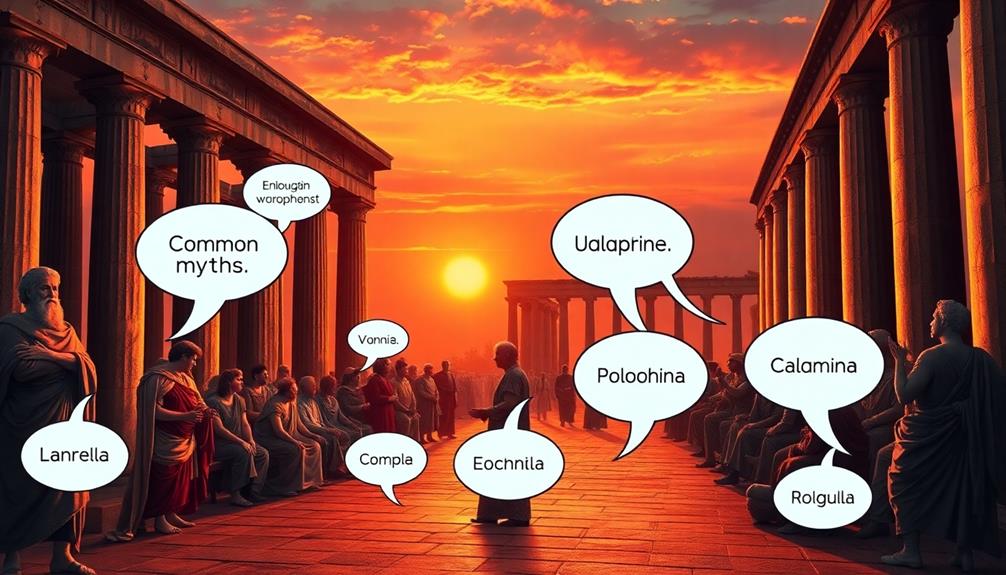Embracing uncertainty is easier when you turn to ancient Greek philosophy, particularly Stoicism. Focus on what you can control and let go of what you can't. Practice self-reflection to understand your values and strengthen your resilience. Cultivating gratitude helps shift your mindset from scarcity to abundance, while building strong relationships provides essential support during tough times. By accepting change as a natural part of life, you can adapt and grow. Remember, seeing challenges as opportunities enhances your emotional resilience. There's much more to explore that can help you navigate uncertainty effectively.
Key Takeaways
- Practice self-reflection regularly to enhance emotional resilience and understand your core values amidst uncertainty.
- Embrace a growth mindset that views challenges as opportunities for personal development and adaptability.
- Utilize negative visualization to prepare emotionally for potential difficulties and foster gratitude for present circumstances.
- Build and nurture meaningful relationships that provide support and strength during life's unpredictable moments.
- Apply Stoic principles by focusing on what you can control and accepting what you cannot change to maintain emotional balance.
Understanding Stoicism's Core Principles
In traversing life's uncertainties, you can find valuable guidance in Stoicism, an ancient Greek philosophy that emphasizes virtue and emotional resilience. Founded around 300 BC, Stoicism teaches you the importance of focusing on what you can control while accepting what you cannot.
Key figures like Zeno of Citium, Seneca, Epictetus, and Marcus Aurelius highlight that true fulfillment comes from living according to rational thought and virtuous action. Additionally, modern applications of AI, such as AI-Powered Virtual Reality in E-Learning, echo the Stoic principle of adapting to circumstances, showing how technology can enhance our learning and personal growth.
At the heart of Stoicism are four cardinal virtues: wisdom, courage, justice, and temperance. These principles guide your reactions and decisions, helping you maintain emotional stability amid chaos. By practicing Stoicism, you learn to view obstacles as opportunities for growth, fostering resilience in the face of challenges.
One effective technique Stoics recommend is negative visualization. By imagining worst-case scenarios, you prepare emotionally for potential difficulties and cultivate gratitude for your current circumstances. This practice shifts your focus from external events to your personal responses, empowering you to navigate uncertainties with confidence.
Ultimately, embracing Stoicism allows you to lead a more fulfilled and purposeful life, regardless of the unpredictability around you.
The Importance of Self-Reflection

Self-reflection is key to enhancing your self-understanding and cultivating inner strength. By regularly questioning your beliefs and actions, you sharpen your critical thinking skills and gain insight into your true values.
This practice not only helps you navigate uncertainty but also empowers you to respond more effectively to life's challenges. Engaging in self-reflection can also align with strategies for practicing positive thinking, which encourage a proactive mindset and facilitate real change in your life.
Enhancing Self-Understanding
The journey to enhancing self-understanding begins with the practice of self-reflection, an essential tool that encourages you to examine your beliefs and actions critically. As Socrates highlighted, this introspective approach fosters not just awareness but also personal growth. Regular self-reflection can help you identify and overcome obstacles, ultimately leading to improved emotional intelligence.
Engaging in practices like journaling and meditation creates structured time for introspection. Aristotle's concept of the golden mean suggests that self-reflection helps you find balance, promoting harmony by avoiding extremes in behavior and thought. By reflecting on past experiences, you enhance your ability to make informed choices in the future.
Here's a quick comparison of self-reflection techniques:
| Technique | Benefits |
|---|---|
| Journaling | Clarifies thoughts and feelings |
| Meditation | Reduces stress and increases focus |
| Mind Mapping | Visualizes ideas and connections |
| Conversations | Gains insights from others' perspectives |
Incorporating self-reflection into your daily routine not only enhances self-understanding but also equips you with the tools to navigate life's uncertainties more effectively.
Fostering Critical Thinking
Three key benefits emerge when you embrace self-reflection to foster critical thinking.
First, by regularly examining your beliefs and actions, as Socrates advised, you enhance your self-understanding. This deeper awareness allows you to question your assumptions and motivations, sharpening your critical thinking skills. Engaging in self-reflection can also help you identify and avoid traversing life's tiny pitfalls, further enhancing your ability to learn from past mistakes.
Second, self-reflection promotes personal responsibility, a principle cherished by the Stoics. By accepting your thoughts and reactions, you cultivate emotional resilience, which helps you face life's uncertainties more effectively. You learn to navigate challenges with a clearer, rational mindset.
Lastly, Aristotle's concept of the golden mean highlights how self-reflection can help you find balance in your life. By avoiding extremes, you create a stable foundation for well-being. This balance equips you to assess situations more logically, leading to informed decision-making.
Incorporating self-reflection into your daily routine empowers you to think critically and adaptively. It enhances your ability to confront challenges, making you more resilient and effective in traversing life's complexities.
Embrace self-reflection, and watch your critical thinking flourish, guiding you through uncertainty with confidence.
Cultivating Inner Strength
Inner strength emerges from the practice of self-reflection, allowing you to explore your beliefs and motivations. As Socrates emphasized, self-reflection fosters self-awareness, enhancing your understanding of your actions and core values.
By engaging in regular self-examination, you can identify what's truly important to you, promoting resilience when faced with uncertainty. This process parallels the development of self-regulation, where understanding your emotions and behaviors can lead to better coping strategies in uncertain situations.
When you practice critical thinking during self-reflection, you empower yourself to question assumptions and gain a clearer perspective on challenges. Reflecting on past experiences—both mistakes and successes—builds emotional resilience, preparing you for future uncertainties.
This process is crucial; it not only helps you learn but also reinforces your capacity to adapt and grow.
Incorporating self-reflection into your daily routine can greatly enhance your mental fortitude. As you navigate life's complexities, you'll find that taking time to pause and reflect allows you to approach situations with greater ease and confidence.
Finding Balance in Life

Finding balance in life is essential for maneuvering its complexities and uncertainties. Ancient Greek philosophy offers valuable insights into achieving this harmony. Aristotle's concept of the golden mean suggests that you should avoid extremes; instead, aim for moderation in your pursuits. This balanced approach fosters resilience and well-being, allowing you to navigate life's ups and downs effectively.
Embracing unconditional love in your relationships can further enhance your emotional stability during turbulent times.
Stoicism teaches you to focus on what you can control, which helps maintain emotional balance despite external chaos. By integrating various aspects of your life—work, relationships, and personal interests—you cultivate stability and strength.
Self-reflection, a practice endorsed by Socrates, equips you with insights into your beliefs and actions, enabling you to adopt a balanced perspective when faced with challenges.
Additionally, nurturing meaningful relationships, as emphasized by Plato, provides essential support. These connections contribute notably to a balanced and resilient life.
Building Strong Relationships

Building strong relationships starts with recognizing the importance of connection in your life.
By practicing active listening, you can nurture supportive bonds that help you and others navigate uncertainties together.
Incorporating practices from supporting a partner ready for parenthood can also strengthen these connections.
This mutual understanding lays the groundwork for resilience, making it easier to face challenges as a united front.
Importance of Connection
Throughout history, the significance of connection has been a cornerstone of human experience. Building strong relationships isn't just about companionship; it's an essential element in fostering resilience. Stoic philosophy emphasizes that community support is important during challenging times. When you cultivate meaningful connections, you gain emotional strength and stability, which are necessary for maneuvering life's uncertainties.
For new parents, practical advice for relationship maintenance can help in fostering these connections while managing the demands of family life. Nurturing these relationships, especially in adversity, enhances your coping abilities and promotes a sense of belonging. This sense of belonging is essential for your mental well-being.
Ancient thinkers like Plato believed that supportive social bonds are integral to overcoming life's hurdles. Engaging with others through shared experiences allows you to develop a deeper understanding of yourself and your values.
As you lean on your connections, you'll find that open dialogue and communication become key components of resilient relationships. These interactions not only help you process challenges but also enrich your life with diverse perspectives.
Ultimately, embracing the importance of connection can lead you to greater emotional fortitude, reminding you that you're never truly alone in facing the uncertainties of life.
Active Listening Techniques
Active listening is an essential skill that can transform your relationships, allowing you to connect more deeply with others. This practice, rooted in the teachings of ancient philosophers, emphasizes the importance of fully concentrating, understanding, and responding to what someone is saying.
By employing active listening techniques, you foster mutual respect and enhance the quality of your conversations, aligning with insights on authenticity and existence.
Start by paraphrasing the speaker's words to confirm your understanding and show engagement. Asking open-ended questions encourages them to elaborate, deepening the dialogue. Nonverbal cues are equally important; maintaining eye contact and nodding signals your attentiveness and reinforces their message.
Reflective listening is another powerful technique. By mirroring the emotions or thoughts expressed, you validate the speaker's feelings and create a supportive environment.
Additionally, practicing patience can greatly improve your interactions. Allowing pauses before responding demonstrates that you value their thoughts, leading to a more meaningful exchange of ideas.
Incorporating these active listening strategies not only strengthens your relationships but also embodies the wisdom of ancient philosophers who understood the transformative power of genuine communication.
Nurturing Supportive Bonds
Supportive bonds are vital for steering through life's ups and downs, providing a foundation of strength when challenges arise. Nurturing supportive relationships not only helps you face adversity but also fosters personal growth.
Meaningful connections enhance emotional resilience, allowing you to navigate uncertainty with grace. Building on this, recognizing patterns of behavior in relationships can be essential to identify areas for improvement and growth.
To cultivate these supportive relationships, consider the following strategies:
- Engage in Open Dialogue: Take a page from Plato and prioritize communication. Share your thoughts and experiences to build deeper connections.
- Practice Balance: Aristotle's golden mean teaches us the importance of moderation. Aim for harmony in your relationships, avoiding extremes that can lead to conflict.
- Be Present: Active listening is key. Show genuine interest in others' feelings and experiences, reinforcing the bond you share.
- Share Experiences: Create memories together. Whether it's celebrating successes or facing challenges, shared experiences strengthen your emotional fortitude.
Adapting to Change

In the face of life's inevitable changes, adapting can feel intimidating, yet it's also an opportunity for growth. Heraclitus reminds you that change is the only constant, encouraging flexibility in your mindset. Stoicism teaches that while you can't control external events, your reactions are entirely within your power, fostering resilience. By practicing negative visualization, you can prepare emotionally for potential challenges, enhancing your adaptability.
To find balance during these shifts, consider Aristotle's golden mean. It helps maintain stability and inner harmony when life's extremes threaten to overwhelm you. Embracing change, as Zeno of Citium advised, requires self-discipline and focus on personal growth.
Here's a simple guide to managing change:
| Philosophy | Key Concept | Action Steps |
|---|---|---|
| Heraclitus | Change is constant | Embrace flexibility |
| Stoicism | Control your reactions | Practice negative visualization |
| Aristotle | Find balance | Seek the golden mean |
| Zeno of Citium | Embrace self-discipline | Focus on personal growth |
| Inner Harmony | Stability amid chaos | Cultivate resilience |
Cultivating Inner Strength

Cultivating inner strength is vital for steering through life's uncertainties and challenges. Ancient Greek philosophy, particularly Stoicism, offers valuable insights into how you can develop this resilience.
By embracing the teachings of philosophers like Zeno of Citium and Marcus Aurelius, you can learn to navigate adversity with greater ease. Additionally, just as choosing the right tools can enhance your cleaning routine, selecting appropriate mental practices can markedly improve your ability to cope with life's unpredictability, like focusing on high-capacity batteries for prolonged support during challenges.
Here are four key practices for cultivating inner strength:
- Accept What You Can't Control: Focus on what's within your power and let go of external factors that you can't influence.
- Engage in Self-Reflection: Regularly take time to reflect on your thoughts and emotions. This practice enhances self-understanding and fortifies your ability to handle stress.
- Practice Mindfulness: Stay present and appreciate life's transience. Mindfulness allows you to face uncertainty with courage and clarity.
- Develop Self-Discipline: Train yourself to manage your reactions. This control is vital for maintaining emotional stability during challenging times.
Maintaining a Broader Perspective

To navigate life's uncertainties, you need to embrace the necessity of change and develop a growth mindset.
Recognizing that challenges are opportunities for growth can help you adapt and thrive.
Embrace Change's Necessity
Change is an inevitable part of life, and embracing its necessity can transform your perspective on uncertainty. Heraclitus famously noted that "change is the only constant," reminding you of the importance of adaptability in steering through life's unpredictability.
By accepting change, you can cultivate resilience and view life's fluctuations as opportunities for growth rather than disruptions.
Here are some ways to embrace change's necessity:
- Acknowledge Impermanence: Recognize that circumstances are temporary and that change is a natural part of existence.
- Practice Acceptance: Adopt a Stoic mindset that encourages you to accept change rather than resist it, fostering emotional stability.
- Cultivate Flexibility: Develop a flexible mindset that allows you to adapt to new situations and challenges with grace.
- Appreciate the Present: By understanding the transient nature of life, you can deepen your appreciation for the current moment and engage proactively with evolving situations.
Embracing change prepares you for life's inevitable twists and turns, promoting a sense of ataraxia or inner calm as you maneuver through uncertainty.
Cultivate a Growth Mindset
Embracing a growth mindset can transform how you approach life's uncertainties, turning challenges into stepping stones for personal development. By adopting this mindset, you can view obstacles as opportunities to learn, much like the Stoics who encouraged resilience and adaptability.
Consider the following table that illustrates key concepts of a growth mindset:
| Concept | Description | Example |
|---|---|---|
| Embrace Challenges | See difficulties as chances to grow | Tackling a new project |
| Self-Examination | Reassess beliefs to adapt to new situations | Reflecting on past decisions |
| Balance | Maintain perspective between extremes | Finding a middle ground in conflict |
| Community Support | Rely on diverse views for resilience | Joining a discussion group |
Incorporating ideas from Socratic self-examination and Aristotle's golden mean, you can cultivate a broader perspective that enhances your ability to cope with uncertainty. Accepting change, as Heraclitus taught, allows you to learn from shifting circumstances rather than resist them. By nurturing a growth mindset, you empower yourself to navigate life's unpredictability with confidence and clarity.
The Role of Wisdom

Wisdom plays a pivotal role in steering life's uncertainties, acting as a guiding light amid chaos. Ancient Greek philosophers understood that wisdom isn't just about knowledge; it's about applying that knowledge to enhance your life. By embracing the lessons of these thinkers, you can cultivate resilience and navigate challenges more effectively.
Here are four key aspects of wisdom to reflect on:
- Self-Knowledge: Understand your strengths and weaknesses, as Socrates emphasized. This self-awareness lays the foundation for personal growth.
- Pursuit of Eudaimonia: Aristotle linked wisdom to living a flourishing life. Endeavor for knowledge and virtuous actions that bring emotional fulfillment.
- Appreciation of Simple Pleasures: Epicurus taught that true happiness comes from recognizing what genuinely contributes to your well-being, minimizing unnecessary pain.
- Emotional Resilience: The Stoics, like Epictetus, showed that wisdom helps you distinguish between what you can control and what you can't, enabling you to remain steady in turbulent times.
Practicing Gratitude Daily

Amid the uncertainties of life, cultivating a practice of gratitude can greatly enhance your mental well-being. When you shift your focus from scarcity to abundance, as Epicurus suggests, you foster a positive outlook that can transform your daily experiences.
Research shows that regularly expressing gratitude leads to lower levels of stress and anxiety, contributing to improved emotional resilience and overall happiness.
Incorporating gratitude practices like journaling or verbal affirmations not only promotes mindfulness but also aligns with Stoic principles of reflection and acceptance. By taking time each day to acknowledge what you're thankful for, you deepen your self-awareness and create a more grounded perspective.
Moreover, gratitude strengthens interpersonal relationships. When you express appreciation, you encourage meaningful connections and mutual support, which are invaluable during challenging times.
Engaging in daily gratitude practices has been linked to increased life satisfaction, making it a powerful tool for coping with uncertainty.
Embracing Adversity for Growth

Adversity often serves as a powerful catalyst for personal growth, pushing you to confront challenges head-on. By embracing adversity, you enable yourself to reframe obstacles as opportunities for self-discovery and resilience.
Stoic philosophy teaches that facing difficulties strengthens your character, making you more adaptable in the future. Here are four key ways to embrace adversity for growth:
- Reframe Challenges: View setbacks as lessons that contribute to your personal development.
- Practice Negative Visualization: Anticipate potential challenges to prepare emotionally, fostering gratitude for your current situation.
- Develop Emotional Resilience: Accept adversity as a natural part of life, which enhances your ability to navigate uncertainties.
- Cultivate a Learning Mindset: Transform obstacles into valuable experiences that improve your adaptability and problem-solving skills.
Frequently Asked Questions
Why Is Uncertainty Important in Philosophy?
Uncertainty's essential in philosophy because it challenges you to question your beliefs, fosters critical thinking, and encourages self-reflection. By accepting uncertainty, you cultivate resilience, openness to new ideas, and a deeper understanding of truth.
How Does Ancient Greek Philosophy Influence Us Today?
Ancient Greek philosophy's enduring flame lights your path, guiding you through life's complexities. It urges you to seek fulfillment, embrace self-reflection, and cultivate supportive relationships, empowering you to navigate uncertainty with resilience and purpose.
What Are the Key Points of Ancient Greek Philosophy?
Ancient Greek philosophy emphasizes critical thinking, the pursuit of virtue, and balance in life. You'll find wisdom in Stoicism's resilience, Socratic self-examination, Aristotle's moderation, and Epicurus' appreciation for simple pleasures and supportive relationships.
What Is the Paradox of Uncertainty?
Life's a dance with shadows, where you fear the unknown yet thrive by embracing it. The paradox of uncertainty teaches you that true growth emerges when you accept unpredictability, transforming fear into resilience and opportunity.
Conclusion
Embracing uncertainty isn't just an ancient challenge; it's your modern adventure. By reflecting on Stoic principles, you can find balance amid chaos, nurture meaningful relationships, and adapt to life's twists. Remember, even if you're scrolling through social media, wisdom comes from within. Practice gratitude daily, and view adversity as a stepping stone for growth. So, next time you're faced with the unknown, channel your inner philosopher, and let uncertainty lead you to unexpected opportunities.









